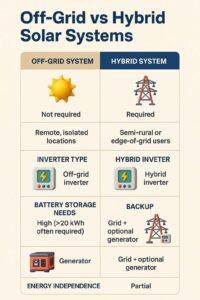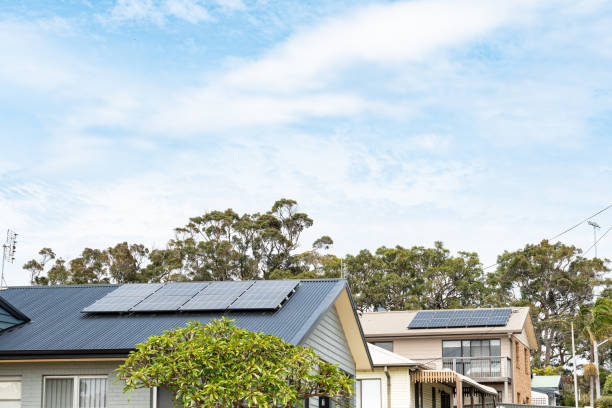As solar technology advances, regional property owners across Western Australia are increasingly investing in sustainable energy solutions. Choosing between off-grid and hybrid solar power systems hinges on understanding power needs, inverter types, battery capacity, and backup requirements. This guide breaks down both options to help determine which setup offers the most reliable and cost-effective performance in remote or rural settings.
1. Overview of Off-Grid & Hybrid Systems
Off-Grid Solar Systems are entirely independent from the main grid. These systems must generate and store all the power required to run a property. They’re suitable for remote areas where grid access is limited or unavailable.
Hybrid Solar Systems, on the other hand, combine solar generation with battery storage and are also connected to the electricity grid. This setup offers the best of both worlds—energy independence when needed, with grid backup for peak demand or battery shortfall.
2. Inverter Types: Key Differences
Choosing the right inverter is crucial for system efficiency and reliability:
- Off-Grid Systems require off-grid inverters capable of managing load fluctuations independently and maintaining a stable power supply without any grid reference. These inverters must also handle surge loads from pumps, motors, and tools—common on regional properties.
- Hybrid Systems use hybrid inverters that can switch between solar, battery, and grid power seamlessly. These inverters are designed to optimise energy usage and feed excess power back into the grid, potentially generating feed-in credits.
When assessing solar inverters Perth suppliers provide, property owners should prioritise robust build quality, surge handling capability, and integration compatibility with modern battery storage systems.

3. Battery Capacity: Meeting Regional Demand
Energy storage is central to both setups, but usage patterns differ:
- Off-Grid Batteries must cover daily usage plus reserve capacity for low-sunlight days. This often means higher capacity battery banks, sometimes exceeding 20kWh depending on the size and usage of the property.
- Hybrid Batteries don’t need to store as much power since the grid can act as a fallback. Typically, hybrid systems use 5–15kWh batteries, enough to cover overnight usage and reduce daytime reliance on the grid.
Battery choice—whether lithium-ion or lead-acid—affects lifespan, performance, and cost. Lithium batteries offer longer lifecycles and higher efficiency, ideal for both off-grid and hybrid applications.
4. Backup Power Considerations
Backup systems are essential for ensuring energy security:
- Off-Grid setups often include a diesel or petrol generator as emergency backup during prolonged cloudy periods or system faults. These need to be correctly sized and maintained to avoid disruptions.
- Hybrid setups rely primarily on the electricity grid for backup, but many still incorporate generators to maintain independence during outages—especially important for properties with unreliable grid connections.
Backup planning should account for critical systems—water pumps, refrigeration, security systems—and ensure continuous operation regardless of weather or grid failures.
5. Cost & ROI Factors
- Off-Grid Systems involve higher upfront costs due to the need for larger battery banks, powerful inverters, and generator backups. However, they eliminate ongoing energy bills entirely and may be the only feasible option for isolated properties.
- Hybrid Systems have lower setup costs and quicker ROI, particularly where feed-in tariffs are available. They also provide a safety net for users who aren’t ready to go fully independent.
Long-term return on investment depends on system sizing, usage patterns, battery lifespan, and energy prices.
6. Which Setup Suits Your Regional Property?
| Criteria | Off-Grid System | Hybrid System |
| Grid Access | Not required | Required |
| Ideal For | Remote, isolated locations | Semi-rural or edge-of-grid users |
| Inverter Type | Off-grid inverter | Hybrid inverter |
| Battery Storage Needs | High (>20kWh often required) | Moderate (5–15kWh) |
| Backup | Generator | Grid + optional generator |
| Cost | Higher upfront | Lower upfront |
| Energy Independence | Complete | Partial |
Conclusion
For regional property owners, selecting the right solar system depends on location, access to grid power, and desired level of energy independence. Off-grid systems provide total autonomy but require higher capital investment and backup planning. Hybrid systems offer a flexible solution with reduced reliance on the grid, lower costs, and increased resilience.
Whether you’re leaning toward full off-grid freedom or a smart hybrid approach, investing in quality solar battery Perth solutions and reliable solar inverters Perth suppliers will ensure your system is built for long-term performance and sustainability.

